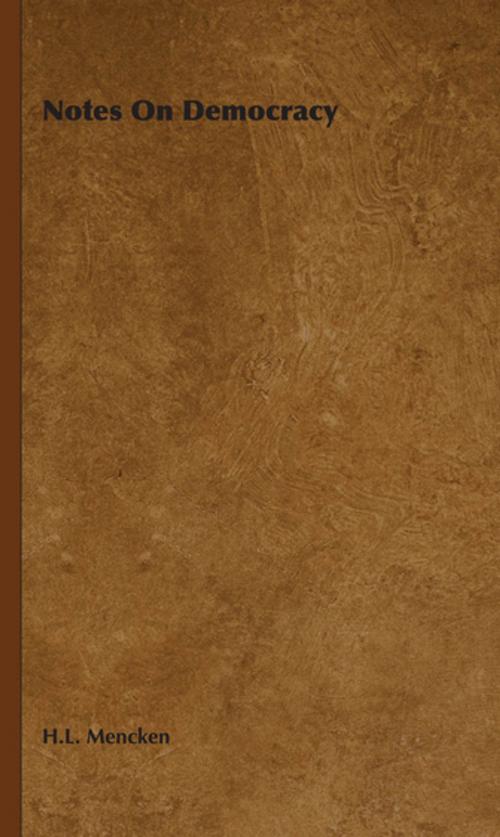Notes On Democracy
Nonfiction, Social & Cultural Studies, Political Science, Politics, History & Theory| Author: | H. L. Mencken | ISBN: | 9781446547946 |
| Publisher: | Read Books Ltd. | Publication: | April 16, 2013 |
| Imprint: | Holmes Press | Language: | English |
| Author: | H. L. Mencken |
| ISBN: | 9781446547946 |
| Publisher: | Read Books Ltd. |
| Publication: | April 16, 2013 |
| Imprint: | Holmes Press |
| Language: | English |
NOTES ON DEMOCRACY by H. L. MENCKEN JONATHAN. Contents include: I DEMOCRATIC MAN 1 HIS APPEARANCE IN THE WORLD 9 2 VARIETIES OF HOMO SAPIENS 15 3 THE NEW PSYCHOLOGY 21 POLITICS UNDER DEMOCRACY 29 5 THE ROLE OF THE HORMONES 35 6 ENVY AS A PHILOSOPHY 42 Jx LIBERTY AND DEMOCRATIC MAN 51 THE EFFECTS UPON PROGRESS 58 9 THE ETERNAL MOB 7 2 II THE DEMOCRATIC STATE 1 THE TWO KINDS OF DEMOCRACY 79 2 THE POPULAR WILL 85 3 DISPROPORTIONAL REPRESENTATION 97 4 THE POLITICIAN UNDER DEMOCRACY 1 07 5 UTOPIA 115 6 THE OCCASIONAL EXCEPTION 124 7 THE MAKER OF LAWS 131 8 THE REWARDS OF VIRTUE 139 9 FOOTNOTE ON LAME DUCKS 148 5 CONTENTS PAGE III DEMOCRACY AND LIBERTY 1 THE WILL TO PEACE 157 2 THE DEMOCRAT AS MORALIST 1 62 3 WHERE PURITANISM FAILS 1 77 4 CORRUPTION UNDER DEMOCRACY 187 IV CODA 1 THE FUTURE OF DEMOCRACY 2O7 2 LAST WORDS 2l8. DEMOCRATIC MAN: HIS APPEARANCE IN THE WORLD. DEMOCRACY came into the Western World to the tune of sweet, soft music. There was, at the start, no harsh bawling from below there was only a dulcet twittering from above. Democratic man thus began as an ideal being, full of ineffable virtues and romantic wrongs in brief, as Rous seaus noble savage in smock and jerkin, brought out of the tropical wilds to shame the lords and masters of the civilized lands. The fact continues to have important consequences to this day. It remains impossible, as it was in the eighteenth century, to separate the democratic idea from the theory that there is a mystical merit, an esoteric and ineradicable rectitude, in the man at the bottom of the scale - that inferiority, by some strange magic, becomes a sort of superiority - nay, the superiority of superiorities. Everywhere on earth, save where the enlightenment of the modern age is confessedly in transient eclipse, the move ment is toward the completer and more enamoured enfranchisement of the lower orders. Down there, one hears, lies a deep, illimitable reservoir of righteousness and wisdom, unpolluted by the corruption of privilege. What baffles statesmen is to be solved by the people, instantly and by a sort of seraphic intuition. Their yearnings are pure they alone are capable of a perfect patriot ism in them is the only hope of peace and happi ness on this lugubrious ball. The cure for the evils of democracy is more democracy This notion, as I hint, originated in the poetic fancy of gentlemen on the upper levels - senti mentalists who, observing to their distress that the ass was over-laden, proposed to reform trans port by putting him into the cart. A stale Chris tian bilge ran through their veins, though many of them, as it happened, toyed with what is now called Modernism. They were the direct ancestors of the more saccharine Liberals of to-day, who yet mouth their tattered phrases and dream their pre posterous dreams. I can find no record that these phrases, in the beginning, made much impression upon the actual objects of their rhetoric. Early democratic man seems to have given little thought to the democratic ideal, and less veneration. What he wanted was something concrete and highly materialistic - more to eat, less work, higher wages, lower taxes. He had no apparent belief in the acroamatic virtue of his own class, and certainly none in its capacity to rule. His aim was not to exterminate the baron, but simply to bring the baron back to a proper discharge of baronial busi ness. When, by the wild shooting that naturally accompanies all mob movements, the former end was accidentally accomplished, and men out of the mob began to take on baronial airs, the mob itself quickly showed its opinion of them by butchering them deliberately and in earnest. Once the pikes were out, indeed, it was a great deal more dangerous to be a tribune of the people than to be an ornament of the old order...
NOTES ON DEMOCRACY by H. L. MENCKEN JONATHAN. Contents include: I DEMOCRATIC MAN 1 HIS APPEARANCE IN THE WORLD 9 2 VARIETIES OF HOMO SAPIENS 15 3 THE NEW PSYCHOLOGY 21 POLITICS UNDER DEMOCRACY 29 5 THE ROLE OF THE HORMONES 35 6 ENVY AS A PHILOSOPHY 42 Jx LIBERTY AND DEMOCRATIC MAN 51 THE EFFECTS UPON PROGRESS 58 9 THE ETERNAL MOB 7 2 II THE DEMOCRATIC STATE 1 THE TWO KINDS OF DEMOCRACY 79 2 THE POPULAR WILL 85 3 DISPROPORTIONAL REPRESENTATION 97 4 THE POLITICIAN UNDER DEMOCRACY 1 07 5 UTOPIA 115 6 THE OCCASIONAL EXCEPTION 124 7 THE MAKER OF LAWS 131 8 THE REWARDS OF VIRTUE 139 9 FOOTNOTE ON LAME DUCKS 148 5 CONTENTS PAGE III DEMOCRACY AND LIBERTY 1 THE WILL TO PEACE 157 2 THE DEMOCRAT AS MORALIST 1 62 3 WHERE PURITANISM FAILS 1 77 4 CORRUPTION UNDER DEMOCRACY 187 IV CODA 1 THE FUTURE OF DEMOCRACY 2O7 2 LAST WORDS 2l8. DEMOCRATIC MAN: HIS APPEARANCE IN THE WORLD. DEMOCRACY came into the Western World to the tune of sweet, soft music. There was, at the start, no harsh bawling from below there was only a dulcet twittering from above. Democratic man thus began as an ideal being, full of ineffable virtues and romantic wrongs in brief, as Rous seaus noble savage in smock and jerkin, brought out of the tropical wilds to shame the lords and masters of the civilized lands. The fact continues to have important consequences to this day. It remains impossible, as it was in the eighteenth century, to separate the democratic idea from the theory that there is a mystical merit, an esoteric and ineradicable rectitude, in the man at the bottom of the scale - that inferiority, by some strange magic, becomes a sort of superiority - nay, the superiority of superiorities. Everywhere on earth, save where the enlightenment of the modern age is confessedly in transient eclipse, the move ment is toward the completer and more enamoured enfranchisement of the lower orders. Down there, one hears, lies a deep, illimitable reservoir of righteousness and wisdom, unpolluted by the corruption of privilege. What baffles statesmen is to be solved by the people, instantly and by a sort of seraphic intuition. Their yearnings are pure they alone are capable of a perfect patriot ism in them is the only hope of peace and happi ness on this lugubrious ball. The cure for the evils of democracy is more democracy This notion, as I hint, originated in the poetic fancy of gentlemen on the upper levels - senti mentalists who, observing to their distress that the ass was over-laden, proposed to reform trans port by putting him into the cart. A stale Chris tian bilge ran through their veins, though many of them, as it happened, toyed with what is now called Modernism. They were the direct ancestors of the more saccharine Liberals of to-day, who yet mouth their tattered phrases and dream their pre posterous dreams. I can find no record that these phrases, in the beginning, made much impression upon the actual objects of their rhetoric. Early democratic man seems to have given little thought to the democratic ideal, and less veneration. What he wanted was something concrete and highly materialistic - more to eat, less work, higher wages, lower taxes. He had no apparent belief in the acroamatic virtue of his own class, and certainly none in its capacity to rule. His aim was not to exterminate the baron, but simply to bring the baron back to a proper discharge of baronial busi ness. When, by the wild shooting that naturally accompanies all mob movements, the former end was accidentally accomplished, and men out of the mob began to take on baronial airs, the mob itself quickly showed its opinion of them by butchering them deliberately and in earnest. Once the pikes were out, indeed, it was a great deal more dangerous to be a tribune of the people than to be an ornament of the old order...















